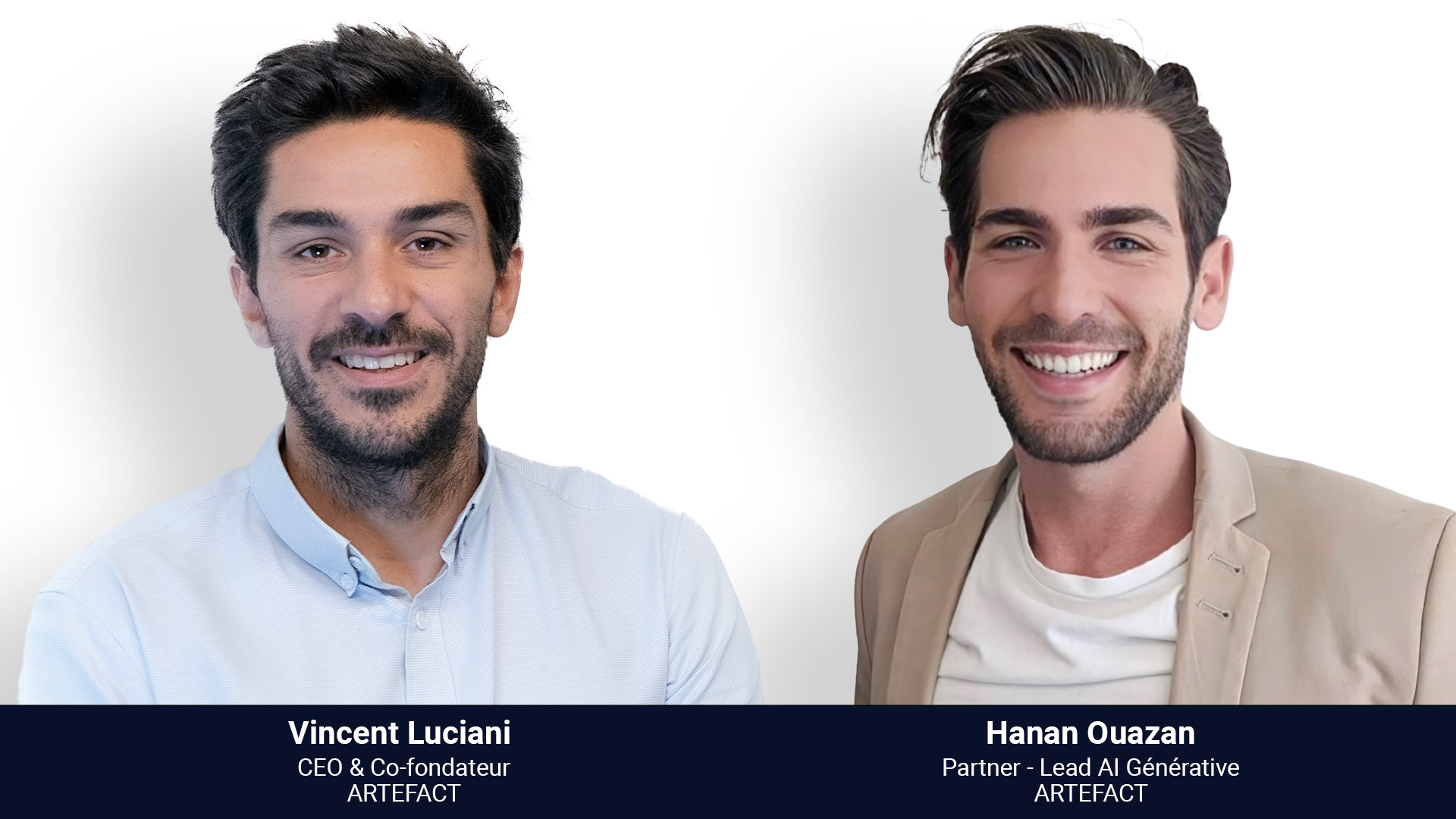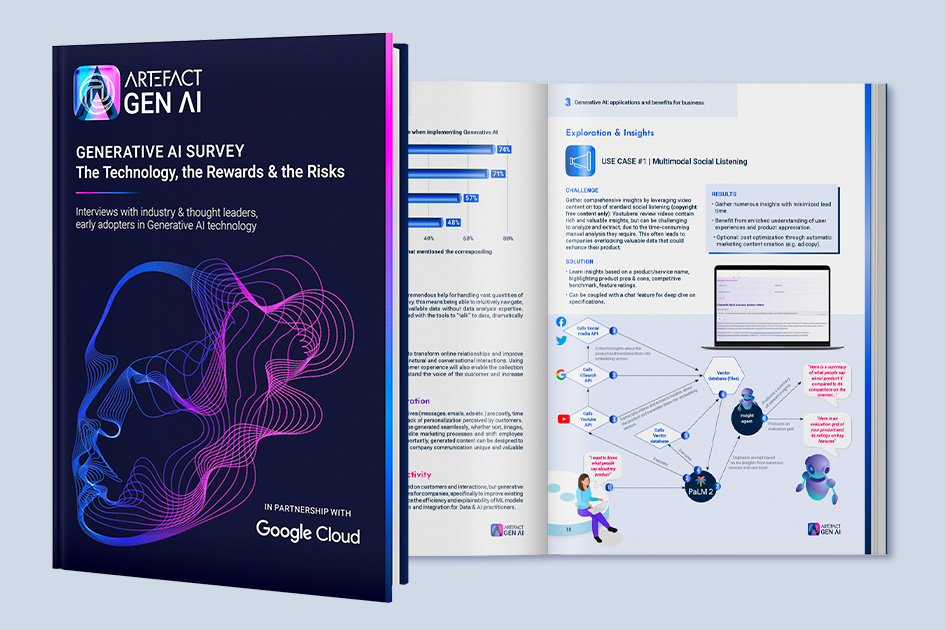Our data & AI consultancy reveals the impact of AI on business productivity in a new white paper.
For the past nine years, Artefact has supported international companies by designing and deploying services that create value and growth through data. In a short time, it has established a solid reputation with 1,000 customers in twenty countries. Artefact provides clients in all sectors with strategic advice and algorithmic solutions that can be integrated into their information systems to enhance their competitiveness.
For example, Artefact’s data expertise enabled the Carrefour Group to implement a sales forecasting algorithm to combat food waste in the bakery and pastry department of its hypermarkets in France. Thanks to this solution, five months after its implementation, around 100 tons of Viennese pastries were saved from being thrown out. Another example is Orange France, which used advanced visual recognition technologies to process 20,000 photos taken daily by fiber optic installers to verify the conformity of the work performed by 10,000 technicians in the field.
A worldwide upheaval
Since late 2022, the AI sector has been booming with the launch of OpenAI’s chatbot, introducing generative AI to the general public. The arrival of this powerful, intuitive tool kickstarted fast-paced competition among the various players in generative AI, from web giants to open source developers.
Today, these technologies are driving business innovation and impacting the entire global economy. Everything is rapidly changing. Large companies need the right support to launch their first use cases using these technologies to benefit from this enormous acceleration in productivity.
All business applications are directly impacted by this revolutionary technology. Artefact offers a wide range of solutions – from strategy and acculturation to operations – to help companies make the most of it.
To shed light on the issues at stake and provide concrete case studies, the company has launched a survey with decision-makers from “early adopter” companies, opinion leaders and technology experts in generative AI, who are sharing their knowledge, initial feedback and first solutions deployed with Artefact and its 1,300 collaborators.
Generative AI: expectations and concrete use cases from 65 companies
Artefact, in partnership with Google Cloud, conducted an in-depth qualitative study based on interviews with over 50 leaders and decision-makers, as well as leading Chief Data Officers, who have already implemented strategies in their organizations. The survey had a quantitative component, with over 65 companies questioned, enabling the identification of emerging trends in terms of needs expressed and use cases to be deployed on a priority basis.
These valuable findings are shared by Artefact in a white paper designed to help decision-makers, experts and non-experts alike, navigate the highly complex landscape of generative AI. The objective is simple: to promote the rapid implementation and adoption of generative AI in their organizations, whatever their size.
Since late 2022, the AI sector has been booming with the launch of OpenAI’s chatbot, introducing generative AI to the general public. The arrival of this powerful, intuitive tool kickstarted fast-paced competition among the various players in generative AI, from web giants to open source developers.
Today, these technologies are driving business innovation and impacting the entire global economy. Everything is rapidly changing. Large companies need the right support to launch their first use cases using these technologies to benefit from this enormous acceleration in productivity.
All business applications are directly impacted by this revolutionary technology. Artefact offers a wide range of solutions – from strategy and acculturation to operations – to help companies make the most of it.
To shed light on the issues at stake and provide concrete case studies, the company has launched a survey with decision-makers from “early adopter” companies, opinion leaders and technology experts in generative AI, who are sharing their knowledge, initial feedback and first solutions deployed with Artefact and its 1,300 collaborators.
“Generative AI will have not only technical, but above all human and organizational impacts within companies. Our study examines the technological choices, adoption strategies, use cases, risks, and prospects of generative AI to offer fresh insights to those about to plunge into experimenting with this technology.”Hanan Ouazan, Partner & Lead Generative AI at Artefact

Multiple use cases in departments: marketing, logistics, IT, finance…
Although its deployment possibilities are many, the main uses of AI can be classified into four categories: making data accessible, optimizing customer relations, creating personalized content, and augmenting human productivity.
1. Data to support human decision-making: The first use category for generative AI involves the accessibility of previously complex data for functions with little or no data analysis skills. The power of AI makes it possible to develop intuitive tools for obtaining new information from very large volumes of data.
A study interviewee, Stéphanie Zeppa, CTO of SOLOCAL, sees generative AI “as an opportunity to support business lines in higher value-added tasks and to develop employees’ skills.”
2. A new dimension in customer relations: The second major use category concerns the company’s relationship with its various audiences. Data makes it possible to provide consumers with increasingly relevant, personalized and fluid responses. Using generative AI, Artefact supports several brands in creating chatbots and call centers, optimizing the efficiency of their website’s search bar, and setting up comprehensive FAQs.
“In some areas, consumer expectations will evolve significantly, and it will be unthinkable, for example, to have a customer service department only accessible by email during office hours”.Olivier Bonnet, CTO of BLABLACAR
3. The holy grail of hyper-personalized content: The third category is the generation of hyper-personalized content (text and visuals) to feed marketing efforts: website content, product sheets, mailings, advertisements, presentations. To produce personalized content at the individual level, large amounts of consumer data must be captured and interpreted. Until now, this holy grail has eluded marketers for both technological and economic reasons. They’ve had to devote a great deal of time and resources to fine-tuning their messages, with no return on investment. Generative AI solves this equation: not only is it capable of fine-tuning its understanding of consumer needs and expectations, it does so much more easily and quickly.
Major B2C brands have already seized on the subject.
“Generative AI will bring brands closer to consumers in an extraordinary fashion. AI is a powerful way to foster engagement.”Isabelle Lafont, Global Head of Care and Consumer Experience at L’ORÉAL
Stéphanie Guédon, Head of acquisition at Maison du Monde, plans to use generative AI as “a kind of exoskeleton to help teams produce inspiring content faster, while leaving the central role in the creative process to collaborators.”
4. Augmenting human productivity: The fourth major application aims to assist humans in their daily work – by summarizing an article, creating meeting minutes, assisting with code writing (coding booster), contributing to data quality, or even deciphering the reasons that led an algorithm to present a conclusion (explicability).
This vision is shared in the white paper by Virginie Dominguez, EVP Digital, Data & Information Systems at Servier Group: “Generative AI opens up new possibilities in terms of efficiency and productivity for all teams and the entire value chain.”
Preparing for the future, now
Generative AI has and will continue to have a positive impact on the operational performance of companies and the productivity of their employees. For companies planning to harness the power of these technologies, however, it’s a question of adopting continuous, controlled growth tailored to the needs of the business, while ensuring that humans retain control of the models.
According to ARTEFACT CEO Vincent Luciani, acceleration is still in its infancy.
“We mustn’t lose sight of the fact that we’re still in the early stages. To prepare for the future, it’s essential that brands quickly gain maturity in generative AI. That’s the purpose of this white paper, written in English to make it easier to share the lessons learned with the management committees of international groups”.

 BLOG
BLOG






